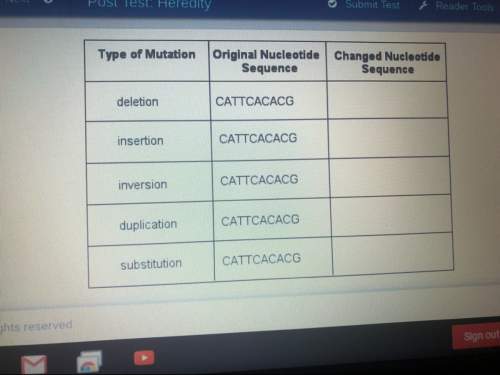Hel
11. Which of these cells is responsible for cell-mediated immunity?
A. B lymphocyte...

Biology, 03.12.2021 21:30 aylinkayla
Hel
11. Which of these cells is responsible for cell-mediated immunity?
A. B lymphocyte
B. plasma cell
C. T lymphocyte
D. phagocyte
12. Which of the following is true of antibodies?
A. They are made by B lymphocytes.
B. They are made by Helper T lymphocytes.
C. They are made by Killer T lymphocytes.
D. They are made by macrophages.
13. Which cells produce chemicals that cause the other parts of the immune system to function?
A. B lymphocytes
B. Helper T lymphocytes
C. Killer T lymphocytes
D. plasma cells
14. Which of the following remain after recovering from an infection and provide immunity?
A. memory cells
B. phagocytes
C. macrophages
D. plasma cells
15. Which of the following immune system cells are the hosts for HIV?
A. B lymphocytes
B. Helper T lymphocytes
C. Killer T lymphocytes
D. plasma cells
16. Which of these is an example of natural active immunity?
A. immunity after receiving a vaccination
B. immunity after recovering from a pathogen infection
C. a baby's immunity resulting from antibodies from its mother
D. None of these choices is correct.
17. Which of the following best explains how vaccinations result in ACTIVE immunity?
A. The vaccination causes a primary immune response and memory cells are retained for life.
B. The vaccination contains antibodies.
C. The vaccination contains lymphocytes from horses.
D. None of these choices is correct.
18. Which of the following practices contributes to bacteria that have resistance to antibiotics?
A. Prescribing antibiotics for diseases that are not caused by bacteria.
B. Self prescribing of antibiotics by people whenever they are ill.
C. Patients stop taking prescribed antibiotics when they begin to feel better instead of finishing the prescription.
D. All of these choices are correct.
19. Which of the following can result in an endemic disease becoming an epidemic?
A. The health of the host population is reduced by overcrowding or stress.
B. There is a drastic increase in the population of the vector of the pathogen.
C. The pathogen mutates to a more dangerous form.
D. All of these choices are correct.
20. What is the name for a disease outbreak that spans several continents or the entire world?
A. an endemic
B. an epidemic
C. a pandemic
D. All of these choices are correct.

Answers: 1


Another question on Biology


Biology, 22.06.2019 04:00
Select the true statements about eubacteria. most live as decomposers and heterotrophs. most only thrive in a narrow range of environments. certain eubacteria are responsible for food poisoning. eubacteria thrive in extreme environments.
Answers: 3

Biology, 22.06.2019 14:50
Lactase is essential for digesting lactose in milk. this enzyme is specific for this sugar. why? molecules and active sites vary in size; only properly sized molecules can fit.there is a precise compatibility between the active site and the lactose molecule.specificity refers to the action of the enzyme, such as hydrolysis, and relatively few molecules can be hydrolyzed.reaction-specific enzymes assume a fit by folding around the most numerous substrate molecules.
Answers: 1

Biology, 22.06.2019 17:30
What is the purpose of presenting a false dilemma in a speech?
Answers: 1
You know the right answer?
Questions

Mathematics, 16.04.2021 21:20






Health, 16.04.2021 21:20

Mathematics, 16.04.2021 21:20


Mathematics, 16.04.2021 21:20


Mathematics, 16.04.2021 21:20




English, 16.04.2021 21:20

Biology, 16.04.2021 21:20



Computers and Technology, 16.04.2021 21:20




